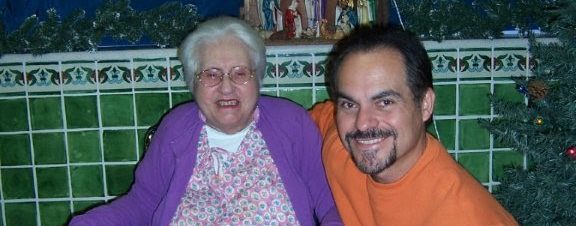My dear mother Dalia died of complications relating to Alzheimer’s disease in April of 2009. But the truth is she was gone long before then.
George and Dalia Diaz celebrating one of her last holidays
Gone was that carefree, childish spirit whose face brightened every time she walked through the turnstiles at Walt Disney World.
Gone was that combative nature that kicked in when a referee’s bad call went against one of the teams her beloved “Jorjito” used to cheer for on game days. Perhaps the suggestion to beat up the refs was a bit extreme.
Gone was her loving, nurturing touch, and the words of comfort she would always give me when I was down.
Dalia Diaz went down that abyss slowly but surely, minute-by-minute, hour-by-hour, day-by-day.
There is no exit plan to stop that spiral. Drugs only delay the evitable. My mother’s painful journey isn’t unique. Unfortunately, an estimated 5.8 million Americans age 65 and older are living with Alzheimer’s dementia in 2020, according to the Alzheimer’s Association. And more than 200,000 Americans have been diagnosed with early-onset Alzheimer’s.
Although research is ongoing and promising, there is no cure. Advocates are still looking for the First Survivor.
The COIVID-19 pandemic has only added stress on caregivers, as most facilities shut down contact with Alzheimer’s patients during peak outbreaks.
I can only speak from prior experience, even though my role was limited because of logistics. I lived in Orlando. My mom lived in Miami. Fortunately, my sisters Diana and Oliva were there for her almost every day of the week during placements in different facilities, based on the progression of the disease.
I would drive down to Miami, walk into her room, and try to engage as best as possible.
“What’s my name?” I would ask her.
“Olivia,” she said.
“No, I’m Jorjito,” I would respond, using her favorite pet name for me.
She would acknowledge the kind correction.
Five minutes later, I would ask her, “What’s my name?”
“Olivia.”
I would laugh, simply because the only other alternative was to break down in tears.
George as a toddler in Cuba with his mom, Dalia
One of the most painful experiences about this insidious disease is coping with two deaths: Alzheimer’s kills the spirit and personality first before it destroys the body.
By 88, my mom’s body and mind had withered, pieces at a time. She couldn’t speak, couldn’t walk, couldn’t eat, as she waited to die on the fourth floor of a nursing home. There was an occasional drip of morphine though her feeding tube to manage the pain.
In one frantic night buried in my memories, I remember her gasping for breath, pausing for a few seconds, and then gasping again. My sisters and I sat by her in the hospital, crying, telling her that we loved her, and it was ok to go. She died three days later.
My pain is no greater than anyone else’s. But I have taken that pain and used it in a positive way, becoming an advocate and fundraiser for the Central Florida branch of the Alzheimer’s Association.
For the last decade, my family and friends have gathered to walk at Lake Eola in Orlando for the group’s annual fund-raiser. It is always a bittersweet journey, but always a good thing that warms my heart. My mother would love the camaraderie we share and would definitely have gotten the biggest and best dessert in our ceremonial post-walk brunch.
It has led me to think of my own future, and vulnerabilities. How do we fight this insidious disease?
Walk at least five or six blocks a day. Learn new tasks. If you are left-handed, use your right hand to write or vice-versa. Eat bright fruits and dark vegetables.
Physical and mental activity, coupled with spirituality, are also important to staving off the gradual debilitating push of Alzheimer’s.
“What’s good for your heart is good for your brain,” said Dr. Ira Goodman, a leading Alzheimer’s specialist in Central Florida.
My heart carries that loving and feisty spirit of my mom with me every day, honoring her memory. She will never be forgotten.
Te quiero mami.
Where to get help and valuable resources if you have Alzheimer’s or are a caregiver:
The Alzheimer’s Association has a 24-7 hotline 800-272-3900
Support is also available on the web: https://www.alz.org/help-support
And be sure to tune in to this month’s Growing Bolder Presents on Thursday, November 19th for more on the challenges of watching a parent suffer from Alzheimer’s disease, featuring Growing Bolder Founder/CEO Marc Middleton and his sister, Molly.














